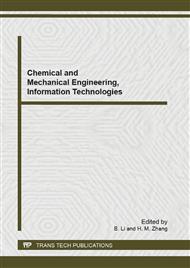[1]
T.M. Cover and J. A. Thomas, Elements of Information Theory[M], America: Wiley , (2006).
Google Scholar
[2]
E. Biglieri,J. Proakis, and S. Shamai. Fading channels: information theoretic and communications aspects[J]. IEEE Trans. Inf. Theory, 1998, 44(6): 2619-2692.
DOI: 10.1109/18.720551
Google Scholar
[3]
L. H. Ozarow, S. Shamai, and A. D. Wyner. Information theoretic considerations for cellular mobile radio[J]. IEEE Trans. Veh. Technol., 1994, 43(2): 359-379.
DOI: 10.1109/25.293655
Google Scholar
[4]
J. Hou, P. H. Siegel, and L. B. Milstein. Performance analysis and code optimization of low density parity-check codes on Rayleigh fading channels[J]. IEEE J. Sel. Areas Commun., 2001, 19(5): 924-934.
DOI: 10.1109/49.924876
Google Scholar
[5]
T. J. Richardson and R. L. Urbanke, Modern Coding Theory[M]. America: Cambridge University Press, (2008).
Google Scholar
[6]
T. J. Richardson, A. Shokrollahi, and R. Urbanke. Design of provably good low-density parity check codes. [J]. Proc. Intern. Symp. on Inf. Theory, 1999, 47: 619-637.
DOI: 10.1109/isit.2000.866497
Google Scholar
[7]
J. Kim and W. E. Stark. Outage probability of LDPC-coded systems. Washington, DC, Proc. IEEE Globecom 2007, 3260-3264.
DOI: 10.1109/glocom.2007.618
Google Scholar
[8]
W. E. Ryan and S. Lin. Channel Codes, Classical and Modern. [M]. America: Cambridge University Press, (2009).
Google Scholar
[9]
A. Guill´en i F`abregas and G. Caire. Coded modulation in the block fading channel: coding theorems and code construction[J]IEEE Trans. Inf. Theory, 2006, 52(1): 91-114.
DOI: 10.1109/tit.2005.860414
Google Scholar
[10]
R. Knopp and P. A. Humblet. On coding for block fading channels[J]. IEEE Trans. Inf. Theory, 2000, 46(1): 189-205.
DOI: 10.1109/18.817517
Google Scholar
[11]
E. Malkamaki and H. Leib. Evaluating the performance of convolutional codes over block fading channels[J]. IEEE Trans. Inf. Theory, 1999, 45(5): 1643-1646.
DOI: 10.1109/18.771235
Google Scholar


